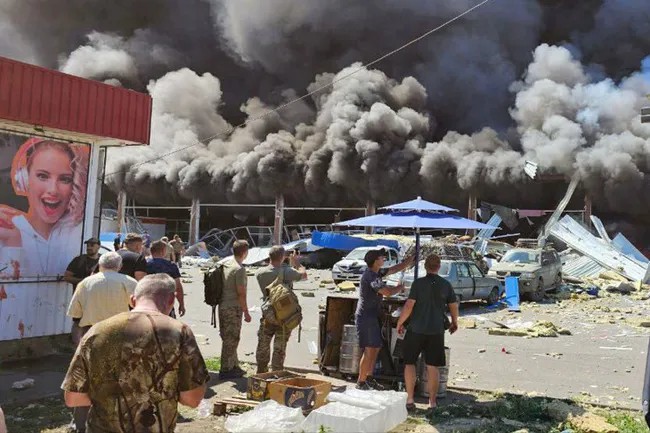On August 9, 2024, Russian armed forces launched yet another massive strike on civilian targets in the city of Kostyantynivka, Donetsk region. This brutal act of terror is part of an ongoing campaign of aggression against the civilian population of Ukraine. The primary targets of the strike included a supermarket, a post office, a clinic, and several other facilities in the city center. The attack has already claimed the lives of 14 people, including two children, and injured more than 43 others. Tragically, there is a possibility that three more children remain trapped under the rubble. Once again, Ukrainian children are suffering! These horrific events confirm that Russia is waging war not only against the Ukrainian military but also systematically targeting the civilian population and infrastructure.
Such actions cannot go unpunished. Russia must be held accountable for the widespread destruction of civilian infrastructure in Ukraine. According to Ukrainian law enforcement agencies, since the beginning of the war, more than 179,000 damaged or destroyed structures have been recorded, including 144,833 residential buildings, 3,425 educational institutions, 821 medical facilities, 628 cultural sites, and 191 religious buildings. Over 200 schools have been completely destroyed, and more than 1,600 educational institutions have been damaged, severely restricting children’s access to education.
The regular shelling and destruction of civilian infrastructure reveal Russia’s intent not only to dismantle Ukrainian statehood but also to annihilate the nation itself by depriving it of future generations. The war in Ukraine continues to devastate the lives of innocent civilians, particularly children, who are forced to adapt to constant threats. In frontline areas, relentless Russian shelling makes it impossible for children to safely attend school.
Ukrainian children should not be deprived of education and a full life, even in times of war. Every child deserves the opportunity to learn, grow, and develop, despite the challenging circumstances. This is why significant efforts are being made to create safe conditions for schooling, particularly in the most vulnerable regions. Currently, nearly one million Ukrainian children are studying online. While online learning is essential given the situation, it cannot fully substitute in-person education. For children, it is crucial not only to acquire knowledge but also to engage in social interaction, connect with teachers and peers—an integral part of their development and emotional well-being.
Despite the harsh conditions in frontline cities of Ukraine, children continue to strive for education and a normal life. In response to the relentless attacks by Russian armed forces, underground schools are being constructed across the country, offering students safety even during shelling. One of the first underground schools was established in Kharkiv, situated six meters below ground and built to meet all modern safety standards. This facility can accommodate up to 900 children, allowing them to continue their education even during missile attacks. Similar efforts are underway in other Ukrainian cities, including Dnipro, Odesa, Zaporizhzhia, and Sumy. In these cities, projects are actively being developed to adapt existing buildings or construct new underground facilities, ensuring that children can safely attend school despite the ongoing threat of shelling.
The construction of underground schools and the creation of safe conditions for children would not be possible without the support of the international community. For example, UNICEF is actively involved in supplying schools with essential resources, enabling children to continue their education despite the ongoing war. However, ensuring the safety and well-being of Ukrainian children requires more than just financial and humanitarian aid from international partners. A critical component in protecting Ukrainian territories is international military support, particularly the provision of air defense and missile defense systems. These systems play a vital role in safeguarding civilians and infrastructure from Russian missile strikes.
An example of such support is the recent statement from the U.S. Department of Defense on August 9, 2024, announcing additional military aid to Ukraine worth up to $125 million. This package includes crucial resources aimed at bolstering Ukraine’s defensive capabilities. Significant contributions are also being made by other countries. For instance, Lithuania is preparing to deliver new M113 armored personnel carriers, electronic warfare systems, short-range surface-to-air missile systems, and additional equipment and supplies to Ukraine.
Top of Form
It is important to emphasize that international support for Ukraine does more than just help the country defend itself against Russian aggression; it also acts as a deterrent against the Kremlin’s potential expansion of aggressive actions into other European nations. Russia has repeatedly threatened various states in pursuit of its imperial ambitions, posing a significant threat to the stability and security of the entire European continent. By supporting Ukraine, the international community is not only aiding the defense of a single nation but also preventing the potential spread of conflict across the region.
The issue of granting permission for Ukraine to use long-range weapons provided by its partners to strike military targets on Russian territory remains highly relevant. This includes targeting bases, depots, and airfields from which attacks on Ukraine are launched. Such authorization would significantly enhance Ukraine’s ability to deter aggression and dismantle critical elements of the enemy’s military infrastructure.
The international community’s actions clearly show that world leaders recognize the critical importance of supporting Ukraine in its fight to maintain independence and ensure security. This support is essential for achieving a just peace and safeguarding the future of Ukrainian children, the civilian population, and other nations against Russian aggression. Furthermore, such assistance helps in preventing the conflict from escalating and curbing Russia’s ambitions to expand into other territories, which is vital for preserving stability in Europe and beyond.
Source: Infodnes

